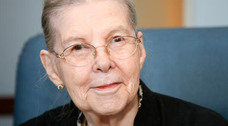As people age, a decline in their intellectual faculties and memory is to be expected. However, when this decline occurs faster than normal, the consequences can become disastrous for both the people affected and their families. A decline this fast is known as dementia.

Alzheimer's disease is characterized by the death of neurons (the cells that play a primary role in brain function), which increases as the disease becomes more severe. This illness can lead to the loss of certain functions or abilities (memory, reasoning, language, judgment, mood etc.)
Causes
A combination of factors specific to each individual could cause Alzheimer's disease. Factors that increase the risk of developing Alzheimer’s disease include age, genetic factors, cranial trauma, cardiovascular disease, obesity, metabolic syndrome, uncontrolled hypertension and diabetes. There are many theories about how these factors develop, and research is being carried out in different areas, such as:
- Family history: any individual can develop Alzheimer's disease, and it is possible for only one member of a family to become afflicted. However, when one family member develops the disease, the risk of developing the disease doubles and even triples for the rest of the family.
- The human body: to determine whether the disease is caused by a chemical imbalance, an accumulation of substances in the brain that are toxic for neurons (amyloid, free radicals etc.), an immune deficiency etc.
- New therapeutic approaches: they aim to slow down -or even stop- the progression of Alzheimer's Disease and to prevent the disease before the onset of any symptoms.
Mini-Psych School videos
| Alzheimer's or just normal aging? A 2011 lecture by Judes Poirier (in French) | Preventing Alzheimer's disease: an impossible dream? A 2012 lecture by John Breitner |
Watch other Mini-Psych School lectures.
Signs and Symptoms
1. Memory loss that interferes with the person's daily activities
The most common, and usually first, symptom to appear is memory loss. Although memory loss can be mild at first, it will quickly become clear that the problem is bigger than simple habitual forgetfulness. Someone in the grip of Alzheimer's disease will frequently forget things, but not remember them later, particularly recent events.
2. Difficulty performing familiar tasks
People suffering from Alzheimer's disease can have difficulty carrying out familiar tasks that they have performed all their lives, such as preparing a meal. They may have difficulty using appliances.
3. Language problems
People suffering from Alzheimer's disease can forget simple words or substitute them with words that make their sentences hard to understand. They may also use phonemic verbal paraphasia (for example, they may say "lion" instead of "violin").
4. Loss of orientation (in time and space)
People with Alzheimer's disease may get lost on their own street, having forgotten how they got there or how to get home. They can wander for many hours around their neighbourhood. They may also have difficulty recalling the day's date.
5. Impaired judgment
People with Alzheimer's disease may have impaired judgment; for example, they may not recognize a health problem that needs to be treated or they will wear warm clothing when it is hot outside.
6. Difficulty performing abstract tasks
People with Alzheimer's disease may have great difficulty performing certain abstract tasks; for example, they may not understand what the numbers in their cheque book represent, they could feel at a loss when faced with a tax form, or they might be unable to plan a trip using public transportation that requires one or many transfers.
7. Misplaced objects
People suffering from Alzheimer's disease may put objects in inappropriate places (an iron in the fridge or a watch in the sugar bowl).
8. Changes in mood or behaviour
People suffering from Alzheimer's disease may have quick mood swings; for example, they can go from calmness to tears or anger for no apparent reason.
9. Changes in personality
People with Alzheimer's disease may become confused, withdrawn, or mistrustful. Among the possible changes are apathy, fear, or behaviour that is abnormal for them.
10. Loss of interest
People suffering from Alzheimer's disease can become very passive and may need a lot of encouragement to take part in activities.
11. Other symptoms
Here are some other observable signs of behavioural or psychological problems:
| Asocial behaviour For example, the subject is apathetic, sits and does nothing, remains indifferent, has little interest in others, cuts off all contact with their friends, or gives up leisure activities. |
Noisy behaviour |
| Sadness | Euphoria, limitless energy |
| Emotional instability | Episodes of depression and anxiety (the subject is aware of his or her cognitive problems) |
| Irritability, or verbal and physical aggressiveness | Insomnia |
| Suspicion | Paranoia |
| Fearful behaviour | Visual or auditory hallucinations (rare) |
| Social disinhibition | Slowed movements |
| Désinhibition sociale | Wandering |
Evolution of the Disease
Alzheimer's disease develops over three progressive phases during which symptoms can overlap.
| Mental faculties |
Mood | Behaviour | Physical | |
Phase 1: Initial (Mild)In phase one of Alzheimer's disease, the person may lead a relatively independent life with minimum help. |
Loss of short-term memory; the person still has long-term memories Difficulty concentrating or limited attention span Problems with orientation Difficulty understanding instructions Forgets dates and people's names |
Mood swings Periods of depression |
Apathy (passivity) Withdrawal Nervousness Anxiety |
Mild coordination problems |
Phase 2 :
|
Continued memory problems Forgets aspects of personal history Inability to recognize friends or family members Disorientation in time and space |
Personality changes Frequent mood swings, confusion, anger Anxiety, apprehension, sadness/ disappointment Mistrust and hostility |
Inability to concentrate Aggressiveness Nervousness (wandering, incessant comings and goings) Disinhibition Repetition Passivity Fantasy |
Assistance required for daily tasks (getting dressed, bathing, grooming etc.) Disrupted sleeping patterns Appetite fluctuation Language problems Problems with oculomotor coordination |
Phase 3 :
|
Loss of the ability to remember Inability to process information Serious problems expressing themselves Major disorientation in time and space and in relation to people |
Possible withdrawal | Non-verbal methods are used to communicate: looks, tears, grunting etc. | Longer and more frequent periods of sleep Immobility Loss of the ability to speak Incontinence (loss of natural functions) Difficulty eating or swallowing Inability to wash and dress themselves Weight loss |
Need help ?
For more information, consult the ressources for family support and the brochure Tips to better deal with anger – Guide for the family.
[Alzheimer's Disease: Causes, symptoms and evolution] [Alzheimer's Disease: Treatments] [Alzheimer's Disease : Advice for the family]




